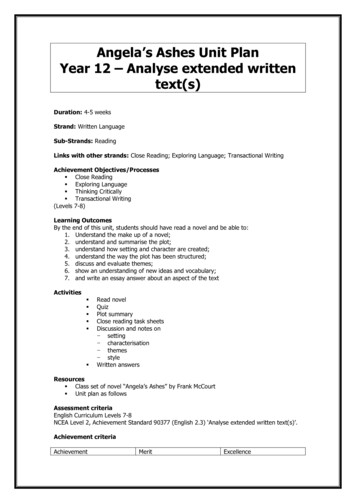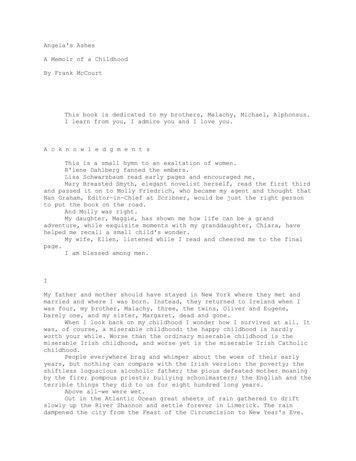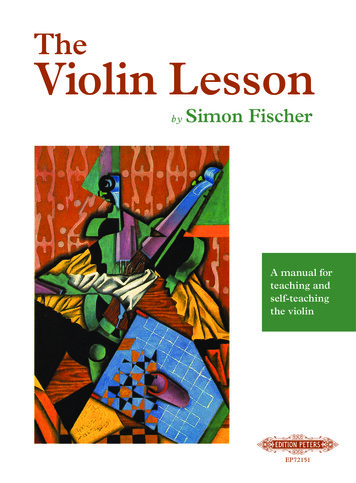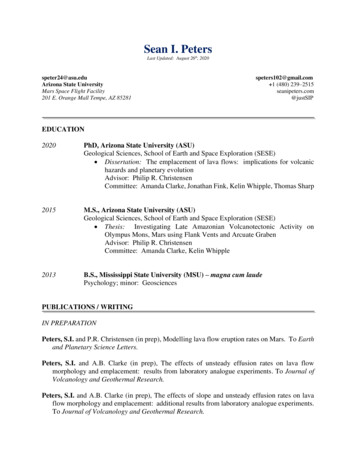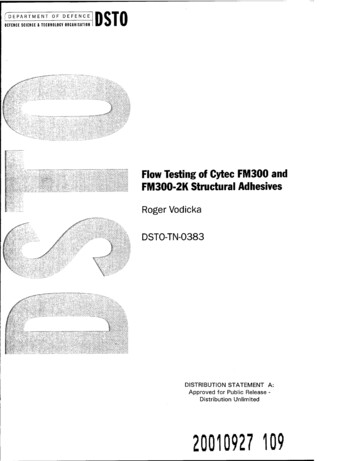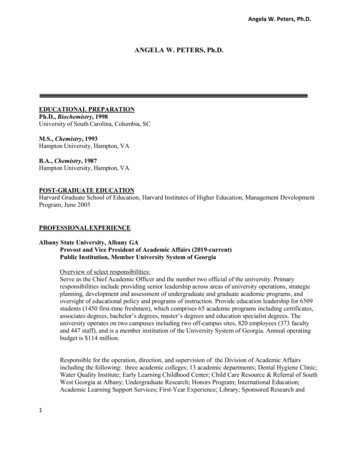
Transcription
Angela W. Peters, Ph.D.ANGELA W. PETERS, Ph.D.EDUCATIONAL PREPARATIONPh.D., Biochemistry, 1998University of South Carolina, Columbia, SCM.S., Chemistry, 1993Hampton University, Hampton, VAB.A., Chemistry, 1987Hampton University, Hampton, VAPOST-GRADUATE EDUCATIONHarvard Graduate School of Education, Harvard Institutes of Higher Education, Management DevelopmentProgram, June 2005PROFESSIONAL EXPERIENCEAlbany State University, Albany GAProvost and Vice President of Academic Affairs (2019-current)Public Institution, Member University System of GeorgiaOverview of select responsibilities:Serve as the Chief Academic Officer and the number two official of the university. Primaryresponsibilities include providing senior leadership across areas of university operations, strategicplanning, development and assessment of undergraduate and graduate academic programs, andoversight of educational policy and programs of instruction. Provide education leadership for 6509students (1450 first-time freshmen), which comprises 65 academic programs including certificates,associates degrees, bachelor’s degrees, master’s degrees and education specialist degrees. Theuniversity operates on two campuses including two off-campus sites, 820 employees (373 facultyand 447 staff), and is a member institution of the University System of Georgia. Annual operatingbudget is 114 million.Responsible for the operation, direction, and supervision of the Division of Academic Affairsincluding the following: three academic colleges; 13 academic departments; Dental Hygiene Clinic;Water Quality Institute; Early Learning Childhood Center; Child Care Resource & Referral of SouthWest Georgia at Albany; Undergraduate Research; Honors Program; International Education;Academic Learning Support Services; First-Year Experience; Library; Sponsored Research and1
Angela W. Peters, Ph.D.Grants; Graduate Studies; Distance Learning; Television and Radio Station; campus site for USG ecampus (e-core).Select accomplishments include: Reorganization of academic colleges and departments to align with university mission andstrategic plan Increased pathways from Associates Degrees leading to Bachelor’s degree Organizational Health Assessment (Environmental Scan) aligned with the Strategic Plan Comprehensive Administrative Review (savings was redirected towards scholarships and newfaculty hires.) Executive member of the Strategic Planning Taskforce New Center for Blockchain, Innovation and Emerging Technology New Health Sciences & STEM Academy Momentum Year Initiative which includes Gateways to Completion (John Gardner Institute) Co-chair of Student Success and Innovation Committee. Implemented an Integrated StudentSuccess Model that collaborates with divisions across the institution. Results show an increasein enrollment by 6%; increase in retention for associate’s degree students by 6 percentage pointsand for bachelor’s degree students by 12 percentage points. Co-chair of Executive Retention Committee Transfer Articulation Agreements with Columbus Technical College, Albany TechnicalCollege, Oconee Fall Line Technical College, Wiregrass Georgia Technical College and AtlantaTechnical College Partnership with Phoebe Health System to increase nursing capacity in the state (LocalHealthcare Workforce Retention Initiative) Developed faculty workload policy, promotion and tenure policy and faculty overloadcompensation policy. National program for University Principal Preparation Initiative through the WallaceFoundation Developed student mentoring group for online learning i.e. online mentoring group(#ASUOMG) Center for Faculty Excellence: during the onset of the pandemic 90% faculty completed OnlineTeaching Certification, based off Quality Matters Standards; retained 95% of new faculty viathe Faculty First-Year Support Program; faculty coaches utilized as mentors; developedmonthly leadership modules for deans and department chairs and developed new aspiringleaders program for faculty. Implementation of staff development for administrative assistants in Academic Affairs SACSCOC executive committee Re-affirmation by accrediting bodies for the following programs: chemistry, business, socialwork, public administration, counselor education, criminal justice, teacher-education, nursing,dental hygiene, medical laboratory technology, health information technology, diagnosticmedical sonography, emergency medical services, histologic technician, occupational therapyassistant, physical therapy assistant, radiologic science, respiratory care. Editor-in-chief for ASU Research Magazine University ambassador for the Affordable Learning Georgia Initiative (low-cost textbookoptions)2
Angela W. Peters, Ph.D.Claflin University, Orangeburg SCVice Provost for Academic Programs (2013-2019)Private Institution, United Methodist AffiliatedOverview of select responsibilities:Member of the President’s extended cabinet and senior leadership team. Monitors programs andinitiatives with Academic Programs and all programs within the Office of the Provost to ensurealignment with university strategic plan. Monitors compliance with accreditation and agencyrequirements at state, regional and federal levels. Key responsibilities include: academic programreview and improvement; oversight of academic enhancement programs for undergraduate,graduate, and professional students; accreditation; strategic partnerships; proposal development;faculty annual evaluations; pre-tenure evaluation; tenure and promotion evaluations; post-tenureevaluations; assessment of student learning and advancement of student success; academicpersonnel hiring (search process); budget development and fiscal accountability; enrollmentmanagement; faculty professional development; program and curriculum development, and thesupport and improvement of teaching and learning. The university profile consists of the following:2100 students (625 first-time freshmen); 25 academic programs including bachelors and master’sdegrees; 350 employees (150 faculty and 200 staff). Annual operating budget is 60 million.Select accomplishments include: Early acceptance with Campbell University (Pharm D.; MPA) and Greenville Health SystemMedical School (MD) Accelerated degree programs with University of South Carolina-Chemical Engineering SC State Legislature Appropriation for Carolina Cluster Pathways Program ( 300,000) SC State Legislature Appropriation for Nursing Program ( 600,000) Online Programs i.e. organizational management, criminal justice, psychology, sociology,master’s business administration; master’s education (curriculum and instruction); RN to BSN. Reformed General Education curriculum. Reduced credit hours and focused on embeddingglobal competencies; writing across the curriculum and critical thinking in core courses.Coordinated Employer Roundtables with quarterly themes such as healthcare, technology,biotechnology and manufacturing. Articulation agreement with Richland County School District Two (satellite computer scienceand engineering courses). Director of the Center for Excellence in Teaching and Learning. Coordinate facultydevelopment opportunities; provide funding for faculty travel and SEED Research projects.Funded by Title III (US Dept. of Education). Interim Director of International Education. Enhanced study abroad (student and faculty-led)initiatives and increased exchange programs and research collaborations with internationalinstitutions. Articulation agreements with school districts in Saudi Arabia, Brazil, Angola, Panama andMexico through the Intensive English Language Program approved by Homeland Security. Interim Executive Director for the Carolina Cluster Pathway Initiative ( 6 million funding fromUNCF/Lilly Foundation for Benedict, Claflin and Voorhees). Coordinated Executive AdvisoryCouncil that includes 70 public and private agencies and corporations. Articulation agreementswith these groups increased internships and employment opportunities. Chair, Academic Affairs Committee Chair, Academic Excellence Taskforce for University Long-Range Plan. Created Chairs Council. Formulation and development of long-range plans for academic units. Created Faculty First-Year Support Program. Increased faculty retention by 80%.3
Angela W. Peters, Ph.D. Implemented Advanced Placement Summer Institute endorsed by the College Board and SCDept. of Education.Capital Campaign Planning Committee for the “Imagine the Possibilities” capital campaign thatraised 105 million.Collaborated with Alumni Affairs and Career Services to develop a student/alumni mentoringand networking program i.e. Panthers at Work Mentoring Program.SACSCOC core committee focusing on accreditation and compliance.Re-affirmation by accrediting bodies for chemistry, biochemistry, music and business.Accreditation of Computer Science by the American Board of Engineering Technology(ABET).Department Chair of Chemistry (2001-2013)Professor (2007); Associate Professor (2001); Tenured (2004)Overview of select responsibilities:Chief departmental, administrative and budget officer responsible for: assisting the Dean withcapacity-building, developing and implementing undergraduate academic standards,undergraduate academic program development, strategic leadership, research, grants and facilitiesadministration, hiring, separation, faculty evaluation, junior faculty mentoring, outreach andresource development.Select accomplishments include: Achieved national approval of the chemistry and biochemistry major by the American ChemicalSociety. Implemented a continuous ACS accreditation compliant program addressing the following:strategic planning, safety, instrumentation, library holding, student learning outcomes,enrollment/graduation rates, scholarship, faculty research and scholarly publications. Enhanced curricula emphasizing experiential learning and internships. Developed 3 4 program with Presbyterian College of Pharmacy. Developed 3 1 program with SC College of Pharmacy (USC and MUSC). Developed NMR Center as Research Core for INBRE institutions. Developed a “Profit Center” using NMR and other analytical instruments as a service center. Secured a ‘Service Contract” with Albemarle, Inc. to run NMR samples. Increased faculty/support staff 4-fold from 4 to 16. Increased student enrollment 3-fold from 26 majors in 2001 to 78 majors in 2012. Increased student placement in STEM graduate school or workforce by 90%. Increased faculty/student research by 100%. Increased grantsmanship by 100%. Promoted research excellence through collaborations, partnerships and external funding. Secured first Cooperative Research & Development Agreement (CRADA) with the United StatesArmy Edgewood Chemical Biological Center (ECBC), Edgewood, Maryland.University of South Carolina, Columbia SCExecutive Director Louis Stokes South Carolina Alliance for Minority Participation (19982001)The Louis Stokes-South Carolina Alliance for Minority Participation (LS-SCAMP) has become a4
Angela W. Peters, Ph.D.keystone for undergraduate STEM retention and a catalyst for degree completion within the state.Housed in the College of Engineering, USC served as lead institution and fiscal agent. LSSCAMP included the following institutions who collectively, contributed the largest underrepresentedminority STEM degrees in the state (30% higher than the national STEM degree rate): two majorresearch universities (the University of South Carolina and Clemson University), four HBCU’s(Benedict College, South Carolina State University, Voorhees College and Claflin University), onelarge community college (Midlands Technical College), and an array of industrial partners. TheExecutive Director managed an annual budget of 5 million between partner institutions and9500 students. Served as liaison between the National Science Foundation and Governing Boardsof partner institutions.Instructor (1994-1996)General Chemistry, Summer Science Camp-EPSCoR,Denmark Technical College (1994-1995)Instructor, General ChemistrySun Refining and Marketing (Sunoco), Marcus Hook PA (1987-1991)Chemist I and Laboratory TechnicianBOARD and COMMITTEE APPOINTMENTSNational Committee Member: College Board-Chair, Academic Affairs, Dream Deferred Conference, 20132019 Board Member: American Reading Company (King of Prussia, PA), 2012-2015 Committee Member: American Chemical Society Taskforce on Undergraduate Programming,(Washington, DC), 2004-2007State Committee Member: University System of Georgia Academic Affairs Council, 2019-present Executive Committee Member: SC Experimental Program to Stimulate Competitive Research(EPSCoR), 2014-2019 Executive Committee Member: SC IDeA Networks of Biomedical Research Excellence (INBRE),2007-2019 Board Member: Medical University of South Carolina-Institutional Research and Academic CareerDevelopment Awards (MUSC-IRACDA), 2008-2012 Committee Member: Southern Education Foundation South Carolina Task Force, Commission onHigher Education: Higher Education Sub-committee, 2001-2003Local Board Member: Albany Civil Rights Institute (Albany, GA), 2019 – present Chair and Board Member: Orangeburg Consolidated School District Five, High School for HealthProfessions (Orangeburg, SC), 2010-2019 Board Member: Richland Two Institute of Innovation, Richland School District Two (Columbia, SC),2014-2019 Board Member: Laurens County Museum Association (Laurens, SC), 2016 - 20195
Angela W. Peters, Ph.D. Board Member: Healing Species (Orangeburg, SC), 2010-2013 Board Member: GEMSS (Girls Emulating Maturity Strength and Scholarship) Advisory Board,Claflin University, 2001-2015HONORS/AWARDS E. Ann Nalley Southeastern Regional Award for Volunteer Services, American Chemical Society,2017 E. Ray McAfee Distinguished Service Award, American Chemical Society, 2013 Louis Stokes Alliance for Minority Participation Distinguished Service Award, 2012 ChemLuminary Award, ACS Women Chemists Committee for Outstanding Outreach to Girls inElementary Education, 2011 Stanley C. Israel Award for Diversity, Southeastern Region of the American Chemical Society, 2010 South Carolina Governors Professor of the Year, 2005 National Millennium Award for Excellence in Teaching, 2004 (White House Initiative on HBCU’s) James E. Hunter Excellence in Teaching, 2004 (Claflin University) Time Warner Cable Unsung Hero Award, 2004 Recognized by the United States Department of Agriculture as providing Outstanding Service andPerformance to the USDA-Agricultural Research Services South Atlantic Region Summer InternshipProgram, 2001 Outstanding Women Graduate Student Research Paper, University of South Carolina, 1998 South Carolina Statewide Research Conference Outstanding Poster Award, 1997 American Association for Cancer Research Minority Scholar Award in Cancer Research, 1996 - 2000 Sigma Xi National Scientific Research Society, 1996 South Carolina Academy of Science Graduate Research Award, 1996 Sigma Xi Graduate Research Award, 1996 National Institute of Health Supplemental Research Fellowship, 1995-1997 Hoechst Celanese Specialty Division Academic Scholarship, 1992 Minority Biomedical Research Support, 1991-1993PUBLICATIONSSelect Books/Chapters/ReportsPeters, A.W. & Johnson, Kenyatta (In press 2021), Albany State University Academic Advising as a Toolfor Student Success and Educational Equity, in Chelsea Fountain (ed.) Academic advising as a tool forstudent success and educational equity. University of South Carolina, National Resource Center for TheFirst-Year Experience & Students in Transition.Peters, A.W., Li, N. & Smith, D. (2020), Supporting the Academic Success of Pre-Service Teachers, in NanLi, Angela W. Peters, Courtney A. Howard (eds.) A Research Perspective: Preparing Pre-Service Teachersfor Academic Success Across South Carolina. Charlotte, NC: Information Age Publishing ISBN:9781648021923Peters, A.W., Tisdale, V.A. & Swinton, D. (2019), High-Impact Educational Practices that Promote StudentAchievement in STEM, in Zakiya S. Wilson-Kennedy, Goldie S. Byrd, Eugene Kennedy, Henry T. Frierson6
Angela W. Peters, Ph.D.(ed.) Broadening Participation in STEM (Diversity in Higher Education, Volume 22) Emerald PublishingLimited, pp. 183-196. ISBN: 9781787569089Peters, A.W. & Tisdale, V.A. (2015), Paradigm Shift: Infusing Research into Teaching and Learning atClaflin University, in Jeton McClinton , Mark A. Melton , Caesar R. Jackson , KimarieEngerman (ed.) Infusing Undergraduate Research into Historically Black Colleges and UniversitiesCurricula (Diversity in Higher Education, Volume 17) Emerald Group Publishing Limited, pp.47 – 6Peters, S.G. & Peters, A.W. Choosing to Believe: Creating a Framework for School Success. SouthCarolina: Peters Group Foundation, 2009. USA Best Book Award, 2010 Education Pre-K12 category.ISBN: 9780979002830“Miles to Go, 2002” South Carolina Education Foundation Task Force, Commission on Higher Education.Williams, A.W. [Critical analysis of education in the state of South Carolina. Strategies for recruitmentand retention of underrepresented minority students and faculty].Select Peer-Reviewed JournalsLi, N., & Peters, A.W., “Promise of a democratic society: Preparing pre-service teachers for under-servedELLs”, Teacher Education Journal of South Carolina, Vol. 11, No. 2 (2018).Li, N., & Peters, A.W., “Preparing K-12 Teachers for ELLs: Improving Teachers’ L2 Knowledge andStrategies Through Innovative Professional Development” Urban Education (SAGE Publications), (2016).doi: 10.1177/0042085916656902Nagampalli, R.S.K., Gunasekaran, K., Narayanan, R.B., Peters, A.W., Bhaskaran, R. A Structural BiologyApproach to Understand Human Lymphatic Filarial Infection. PLoS Negl Trop Dis 8(2): e2662. (2014).doi:10.1371/journal.pntd.0002662Peters, A.W., Mani, D., Rasathurai, S., Greene, M., “The Effectiveness of Supplemental Instruction andTechnology in Increasing Student Performance in Mathematics”, Journal of Women and Minorities inScience and Engineering, Vol. 12, Issue 1, (2006).Peters, A.W., “Teaching Biochemistry at a Minority Serving Institution: An Evaluation of The Role ofCollaborative Learning As A Tool For Science Mastery”, J. of Chemical Education, 82: 571-574 (2005).Hoganson, D.K.; Williams, A.W; Berger, S.H. “ Isolation and characterization of thymidylate synthasedeficient human tumor cell lines”, Biochemical Pharmacology, 58: 1529-1537 (1999).Williams, A.W.; Dunlap, R.B.; Berger, S.H. “A hydroxyl group at residue 216 is essential for catalysisby human thymidylate synthase”, Biochemistry, 37: 7096-7102 (1998).Select Technical Papers(* undergraduate student; **graduate student)7
Angela W. Peters, Ph.D.*Barnes, K.; Kalsum, A.; Peters, A.; Raja, M.; Gwengo, C. “Synthesis, Spectroscopic and In vitroAntibacterial Activity of Ferrocene-Derived Penicillin Chelate”, Proceedings of the South Eastern RegionalAmerican Chemical Society meeting, Atlanta, GA, November 2013.*Burke, B., Kalsum, A., Raja, M., Peters, A.W. “Synthesis, Characterization and AntibacterialActivities of Fluoroquinolone-Ferrocene Metal Complexes”, Proceedings of the South EasternRegional American Chemical Society meeting, Raleigh, NC, October 2012.**Singh, M.; Kalsum, A.; Peters, A.; Raja, M. “Spectroscopic analysis of Pathogen-ligand bindinginteractions of metal containing chromophores bound to fluoroquinolones”, Proceedings of the SouthEastern Regional American Chemical Society meeting, Richmond, VA, October 2011.*Cosme, L., Kalsum, A., Peters, A., “Binding studies of C195A mutant of human Thymidylate Synthase”Proceedings of the South Eastern Regional American Chemical Society meeting, New Orleans LA,December 2010.*Cosme, L.W., **Void, S., Kalsum, A., Peters, A.W., “Sulfhydryl group modification and functionalanalysis of C180 and C195 mutants of human Thymidylate Synthase”, Proceedings of the South EasternRegional American Chemical Society meeting,
Accelerated degree programs with University of South Carolina-Chemical Engineering SC State Legislature Appropriation for Carolina Cluster Pathways Program ( 300,000) SC State Legislature Appropriation for Nursing Program ( 600,000) Online Programs i.e. organizati
